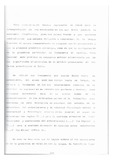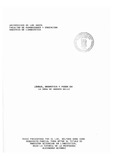| dc.rights.license | http://creativecommons.org/licenses/by-nc-sa/3.0/ve/ | |
| dc.contributor.advisor | Álvarez Muro, Alexandra | |
| dc.contributor.author | Belfore, More | |
| dc.date.accessioned | 2011-01-18T14:48:08Z | |
| dc.date.available | 2011-01-18T14:48:08Z | |
| dc.date.issued | 2011-01-18T14:48:08Z | |
| dc.identifier.uri | http://www.saber.ula.ve/handle/123456789/32190 | |
| dc.description.abstract | Dentro del proyecto de transformación cultural de las élites
que acompañan la emergencia de las naciones hispanoamericanas, se
desarrolla un proceso de planificación lingüística en el que
intervienen diferentes figuras. Una de las más importantes es la
de Andrés Bello. Su papel en esta acción abarcó todas las tareas
de la planificación. Sin embargo, su labor se desarrollo de
manera primordial en la producción de textos que no sólo servían
de basamento al control de los hábitos lingüísticos, sino que
además condensaban un esfuerzo para dotar a la planificación y al
discurso gramatical en que se apoyaba de una fundamentación
ideológico-epistemológica. Por esta razón muchos de sus escritos
son reveladores de los lineamientos principales del programa.
Bello establece como objetivo de la planificación la
uniformización de la praxis lingüística de los habitantes de las
naciones surgidas del tronco español. Este objetivo presenta
diferentes alcances. En una primera etapa, se restringiría al
sector social hegemónico, pero a largo plazo se pensaría en una
amplia mayoría de la sociedad. Del mismo modo, Bello presenta
diversos argumentos justificatorios. La planificación debía
contribuir a la preservación del código frente a las
transformaciones vertiginosas a que estaba expuesto. Con ello se
preservaba uno de los elementos identificatorios y un instrumento
de interacción comunicativa en la escala establecida por el mundo
moderno.
Otro problema al que Bello atiende es al de la elección de
la variedad que será promovida. Esa variedad corresponde a lo que
podría llamarse el español culto y, en esto, se acoge a la
opinión mayoritaria del sector ilustrado. Sin embargo, el asunto
es más complejo. Más que la elección de una variedad homogénea
que exista de modo independiente, se trata de la formación de un
constructo que tiene como base elecciones hechas en diferentes ámbitos
de la praxis. En este caso se privilegian los siguientes:
sector educado, uso de Castilla, lengua escrita y,
esta, la literatura española del siglo de oro.
Hay un tercer componente que tiene también dentro de
profunda significación ideológica: la noción de lengua. Ella constituye el
basamento conceptual que permite la articulación del constructo.
Esto se desprende de las características de los componentes de
su definición. En tanto sistema artificial, la lengua es una
instancia en que se pretende representar un orden producto de la
acción humana y que se proyecta como ordenador de la praxis. En
tanto se trata de un sistema de signos, la lengua deviene en
instrumento para la objetivación del espíritu. Esto supone que, a
pesar de su independencia, la lengua cumple una función
secundaria en relación can la estable esfera del espíritu. La
lengua presenta, así, los atributos para su aceptación dentro de
la planificación. Define la única variedad ordenada que está en
condiciones de estabilizar la praxis lingüística | es_VE |
| dc.description.sponsorship | Universidad de Los Andes | es_VE |
| dc.rights | info:eu-repo/semantics/openAccess | |
| dc.subject | Lengua | es_VE |
| dc.subject | Gramática | es_VE |
| dc.title | Lengua, gramática y poder en la obra de Andrés Bello | es_VE |
| dc.type | info:eu-repo/semantics/masterThesis | |
| dc.description.abstract1 | A process of linguistic planning is taking place within the
proyect of cultural transformation of the elites which occur
together with the emergency the hispanic nations are going
through. This planning involves different literary authors among which
Andrés Bello is one of de most important figures. Bello
developed all the tasks involved in the proyect. However his main
role, as seen in many of his writings, was concerned with the
production of texts that were both the basis of control of
certain linguistic habits as wall as the result of a lot of
effort put into with the purpose of providing the ideological and
epistemologycal foundations of the proyect of planning and the
grammatical discourse.
The objetive of Bello is the unifications of the linguistic
praxis of the inhabitants of the nations with spanish roots.
Within the scope of this objetive there is, in the first place,
the hegemonic social group. However, on the long run, it would
include a larger sector of society. The arguments Bello present
justify the purpose of the planning since it should contribute
to presentation of the code in spite of the dramatic
transformations to which it was being exposed, keeping as
comunicative tool and element of identification of a demanding
modern world.
Bello in also concerned with the selection of the linguistic
variety that would be promoted. This variety is what has been
called the learned spanish defined according to the mayority of
the cultured sector of society. However, even more important than
the election of a homogenious variety is the formation of a
construct created on the basis of choices made in the different
areas of the praxis. According to these the following are
priviliged: the educated sector of society, the use of the
castilian variety, written lenguage, and among this, the spanish
literature of the Golden Century.
Similarly, the idea of langue has a very important
ideological meaning since it is the conceptual foundation that
allows the formation of the construct. As an artificial system,
the langue is an instrument in which an order, product of human
action, is represented and the same time acts as an organizer of
the praxis. As a system of slgns, the langue becomes an
instrument of the objectification of the spirit wich supposes
that, in spite of independence, the langue plays a secondary role
in relation with the stable sphere of the spirit. It presents the
quality for its acceptance within the planning since defines the
only ordered variety which can make the linguistic praxis stable | es_VE |
| dc.description.grado | Maestría | es_VE |
| dc.publisher.pais | Venezuela | es_VE |
| dc.subject.facultad | Facultad de Humanidades y Educación | es_VE |
| dc.subject.institucion | Universidad de Los Andes | es_VE |
| dc.subject.keywords | Grammar | es_VE |
| dc.subject.keywords | Language | es_VE |
| dc.subject.postgrado | Postgrado en Llingüística | es_VE |
| dc.subject.thematiccategory | Artes y Humanidades | es_VE |
| dc.subject.tipo | Tesis | es_VE |
| dc.type.media | Texto | es_VE |



